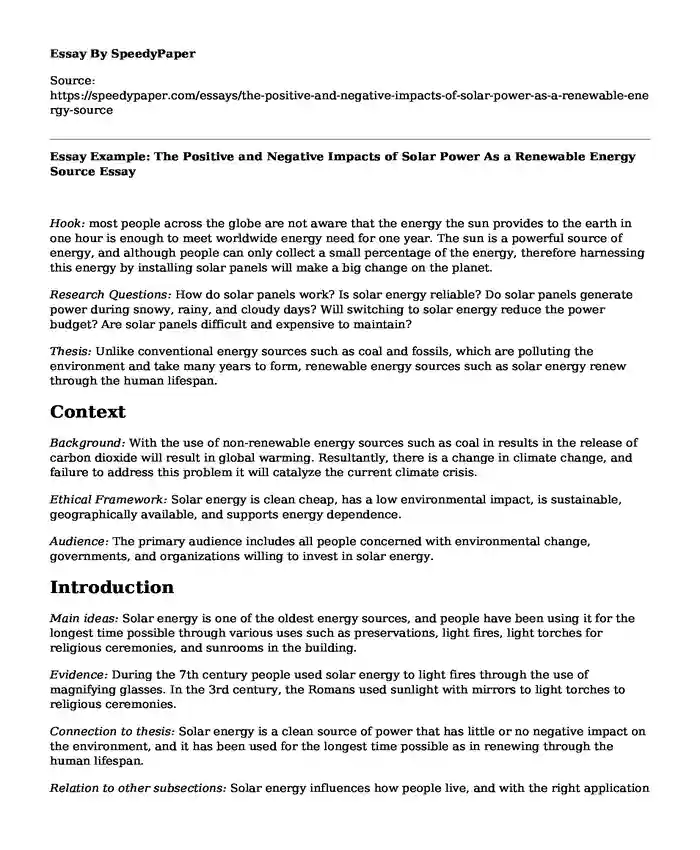Hook: most people across the globe are not aware that the energy the sun provides to the earth in one hour is enough to meet worldwide energy need for one year. The sun is a powerful source of energy, and although people can only collect a small percentage of the energy, therefore harnessing this energy by installing solar panels will make a big change on the planet.
Research Questions: How do solar panels work? Is solar energy reliable? Do solar panels generate power during snowy, rainy, and cloudy days? Will switching to solar energy reduce the power budget? Are solar panels difficult and expensive to maintain?Thesis: Unlike conventional energy sources such as coal and fossils, which are polluting the environment and take many years to form, renewable energy sources such as solar energy renew through the human lifespan.
Context
Background: With the use of non-renewable energy sources such as coal in results in the release of carbon dioxide will result in global warming. Resultantly, there is a change in climate change, and failure to address this problem it will catalyze the current climate crisis.
Ethical Framework: Solar energy is clean cheap, has a low environmental impact, is sustainable, geographically available, and supports energy dependence.
Audience: The primary audience includes all people concerned with environmental change, governments, and organizations willing to invest in solar energy.
Introduction
Main ideas: Solar energy is one of the oldest energy sources, and people have been using it for the longest time possible through various uses such as preservations, light fires, light torches for religious ceremonies, and sunrooms in the building.
Evidence: During the 7th century people used solar energy to light fires through the use of magnifying glasses. In the 3rd century, the Romans used sunlight with mirrors to light torches to religious ceremonies.
Connection to thesis: Solar energy is a clean source of power that has little or no negative impact on the environment, and it has been used for the longest time possible as in renewing through the human lifespan.
Relation to other subsections: Solar energy influences how people live, and with the right application and use, people can get a cheap and reliable source of energy that is abundantly available.
Economy
Main ideas: The use of solar energy reduces the dependence of other forms of energy and reducing the power bill in the house and company. Moreover, the panels the extra power generated through solar panels can be sold to the neighbors of power companies.
Evidence: some of the economic benefits of using solar energy includes reduced power bills, increased home reseal value, taking advantage of tax credits for state and federal governments, and net metering.
Connection to thesis: Solar energy provides a cheaper form of energy that can be utilized to aim all regions and require a small investment.
Relation to other subsections: solar energy has a great influence on how people live as it improves their income due to reduced power bills.
Conclusion
The goal of the project: The project aims to bring to light the benefits of solar energy and how people can use solar energy to achieve a friendly environment. Consequently, the project will highlight the benefits of solar energy in the economy.
Call to action: People need to increase the use of solar energy as it is cheap, reliable, and sustainable. Governments and organizations should encourage the use of solar energy to reduce the dependence on non-renewable sources of energy and to have a clean environment.
References
Khan, I. (2020). Impacts of energy decentralization viewed through the lens of the energy cultures framework: Solar home systems in the developing economies. Renewable and Sustainable Energy Reviews, 119. https://doi-org.proxygsu-gamc.galileo.usg.edu/10.1016/j.rser.2019.109576
Joshi, S., Sharma, P., & Mishra, K. (2020). Green Growth & Trade Restrictions: Assessing Socio-Economic Impacts of Local Content Requirements in Indian Solar Policy. Journal of Developing Areas, 54(1), 149–162. https://doi-org.proxygsu-gamc.galileo.usg.edu/10.1353/jda.2020.0010
Smith, C. J., Crook, J. A., Crook, R., Jackson, L. S., Osprey, S. M., & Forster, P. M. (2017). Impacts of Stratospheric Sulfate Geoengineering on Global Solar Photovoltaic and Concentrating Solar Power Resource. Journal of Applied Meteorology & Climatology, 56(5), 1483–1497. https://doi-org.proxygsu-gamc.galileo.usg.edu/10.1175/JAMC-D-16-0298.1
Pui-Pui Thong, Yen-Nee Goh, Cheng-Ling Tan, & Ariffin, S. K. (2017). An Investigation on Residential Solar Power Systems (SPS) Install Intention: View from an Emerging Market. Global Business & Management Research, 9, 266–280.
González-Gómez, M. (2017). Estimating the long-run impact of guaranteed prices on wind and solar power in Germany. Energy Sources Part B: Economics, Planning & Policy, 12(8), 692–698. https://doi-org.proxygsu-gamc.galileo.usg.edu/10.1080/15567249.2016.1269141
Hirth, L. (2015). The Optimal Share of Variable Renewables: How the Variability of Wind and Solar Power affects their Welfare-optimal Deployment. Energy Journal, 36(1), 149–184. https://doi-org.proxygsu-gamc.galileo.usg.edu/10.5547/01956574.36.1.6
Suuronen, A., Muñoz-Escobar, C., Lensu, A., Kuitunen, M., Guajardo Celis, N., Espinoza Astudillo, P., Ferrú, M., Taucare-Ríos, A., Miranda, M., & Kukkonen, J. (2017). The Influence of Solar Power Plants on Microclimatic Conditions and the Biotic Community in Chilean Desert Environments. Environmental Management, 60(4), 630–642. https://doi-org.proxygsu-gamc.galileo.usg.edu/10.1007/s00267-017-0906-4
Caldés, N., & Rodriguez-Serrano, I. (2018). Potential Contribution of Concentrated Solar Power in Meeting the Sustainable Development Goals. AIP Conference Proceedings, 2033(1), 120001-1-120001–120011. https://doi-org.proxygsu-gamc.galileo.usg.edu/10.1063/1.5067130
Corona, B., Bozhilova, K. K. P., Olsen, S. I., & San Miguel, G. (2017). Social Life Cycle Assessment of a Concentrated Solar Power Plant in Spain: A Methodological Proposal. Journal of Industrial Ecology, 21(6), 1566–1577. https://doi-org.proxygsu-gamc.galileo.usg.edu/10.1111/jiec.12541
Cite this page
Essay Example: The Positive and Negative Impacts of Solar Power As a Renewable Energy Source. (2023, Aug 22). Retrieved from https://speedypaper.net/essays/the-positive-and-negative-impacts-of-solar-power-as-a-renewable-energy-source
Request Removal
If you are the original author of this essay and no longer wish to have it published on the SpeedyPaper website, please click below to request its removal:
- Free Essay on the Effects of Technology on Manual Jobs
- Social Darwinism Essay Sample for Free Use
- Free Essay Sample on Environmental Campaign
- Free Essay on Publicizing Air Pollution in the United States of America
- Essay Sample Dedicated to the Hospitality Industry Labor Shortage
- Essay Example: The Advancement of the SDG13 for Singapore
- Free Essay Example on Urban Ecosystem Regeneration
Popular categories





